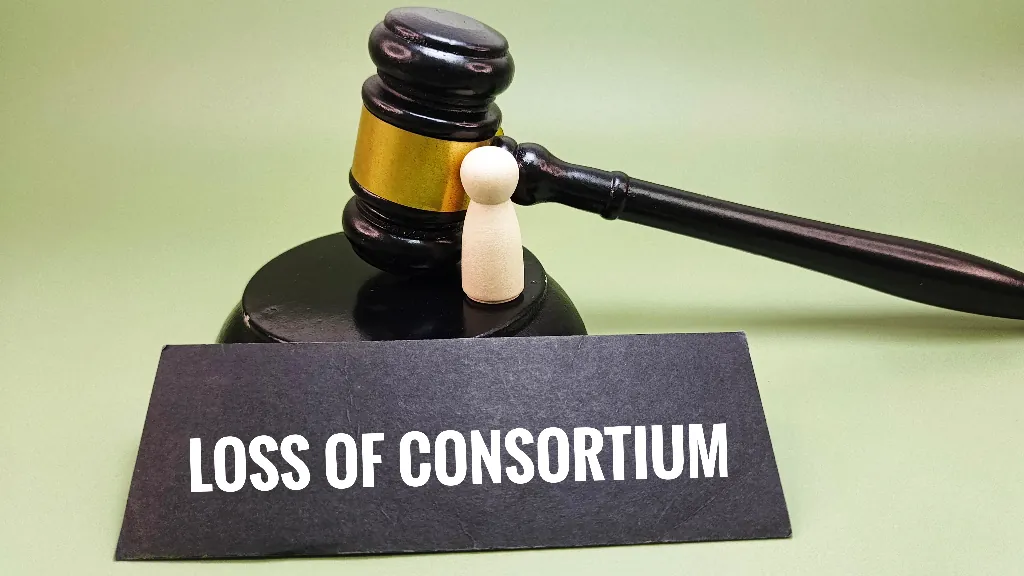
Loss of consortium in Florida is a complex legal concept that can have a significant impact on personal injury claims. When a spouse or family member suffers a severe injury, the emotional and relational damages can be as devastating as the physical ones.
In Florida, loss of consortium claims exist to compensate the spouse or family members of an injured person for the loss of love, companionship, and other aspects of a relationship. In this article, we'll provide an in-depth look at loss of consortium in Florida, including its definition, requirements, damages, and the process for filing a claim.
What is Loss of Consortium in Florida?
Loss of consortium in Florida is generally defined as the deprivation of the benefits of a family relationship, such as love, companionship, affection, and assistance, due to another party's negligence or wrongful act. In most cases, loss of consortium claims involve spouses, although parents and children may also seek compensation in certain situations.
Types of Relationships
Spousal Loss of Consortium
Spousal loss of consortium is the most common type of claim. It occurs when one spouse suffers a severe injury or death due to the negligence or wrongful act of another party. The uninjured spouse may seek compensation for the loss of affection, companionship, and intimate relations they once shared with their partner.
Parent-Child Loss of Consortium
In some instances, parents can seek compensation for the loss of their child's companionship when a negligent person or business seriously injures or kills the child. Similarly, children may also claim loss of consortium if a parent suffers a severe injury or death. The Florida loss of consortium statute for loss of parental consortium provides:
A person who, through negligence, causes significant permanent injury to the natural or adoptive parent of an unmarried dependent resulting in a permanent total disability shall be liable to the dependent for damages, including damages for permanent loss of services, comfort, companionship, and society.
Sibling Loss of Consortium
Though rare, sibling loss of consortium claims may arise in specific circumstances. Generally, these claims involve the loss of love, companionship, and guidance between siblings due to one sibling's severe injury or death caused by another party's negligence.
Requirements for a Loss of Consortium Claim in Florida
Establishing a Legal Marriage or Family Relationship
To pursue a loss of consortium claim in Florida, the claimant must prove a legal marriage or family relationship with the injured party.
Proving Negligence in Florida
The claimant must demonstrate that the defendant's negligence or wrongful act directly led to the injured party's severe injury or death. This requires establishing the four elements of negligence:
- Duty of Care: The defendant owed a duty of care to the injured party (e.g., a driver has a duty to operate their vehicle safely).
- Breach of Duty: The defendant breached that duty (e.g., the driver was speeding or texting and driving).
- Causation: The defendant's breach of duty directly caused the injury or death (e.g., the reckless driving resulted in an accident that caused the injury).
- Damages: The injured party or their family suffered damages as a result of the defendant's negligence (e.g., medical bills, lost wages, loss of consortium).
Demonstrating the Loss
The claimant must provide evidence of the loss of consortium. This may include testimony from the claimant and other family members or friends, as well as expert witnesses such as psychologists or therapists who can attest to the emotional and relational impact of the injury or death on the claimant.
Damages in a Florida Loss of Consortium Claim
Types of Damages in Florida Personal Injury Claims
Economic Damages for Loss of Consortium in Florida
Economic damages refer to the financial losses that the claimant has experienced due to the injured party's inability to contribute to the household. These may include loss of income, medical expenses, and funeral costs (in the case of wrongful death).
Non-Economic Damages for Loss of Consortium in Florida
Non-economic damages are intangible losses that are more difficult to quantify. In a loss of consortium claim, these may include:
- Loss of Love, Affection, & Companionship: The emotional bond between spouses or family members can be deeply affected by a severe injury or death. The claimant may seek compensation for the loss of love, affection, and companionship they once shared with the injured party.
- Loss of Sexual Relations: In cases involving spouses, the loss of intimate relations can be a significant component of non-economic damages. The claimant may seek compensation for the impact the injury has had on their marital relationship.
- Loss of Guidance, Support, & Services: Parents may seek compensation for the loss of guidance and support they would have provided their child, while children may seek compensation for the loss of a parent's guidance, support, and services.
Calculating Damages in a Florida Loss of Consortium Claim
Calculating damages in a loss of consortium claim can be challenging due to the intangible nature of the losses. Courts may consider several factors when determining an appropriate award, such as:
- The Severity of the Injury: More severe injuries may lead to higher damages, as the impact on the relationship is likely to be greater.
- The Duration of the Relationship: Longer relationships may result in higher damages, as the claimant has likely become more reliant on the injured party's love, companionship, and support.
- The Quality of the Relationship: Courts may consider the strength and stability of the relationship prior to the injury, which can influence the amount of damages awarded.
- The Life Expectancy of the Injured Party: The length of time the claimant is expected to suffer the loss of consortium may factor into the damages calculation.
Filing a Loss of Consortium Claim in Florida
Statute of Limitations
In Florida, the statute of limitations for filing a loss of consortium claim is typically two (2) years from the date of the injury. However, in wrongful death cases, the statute of limitations is generally two (2) years from the date of death. Consult with a Florida personal injury attorney to ensure you file your claim within the appropriate timeframe.
Working with a Florida Personal Injury Lawyer
Navigating the legal complexities of a loss of consortium claim can be challenging. A Florida personal injury lawyer can help you understand your rights, gather the necessary evidence, and advocate for the compensation you deserve. They can also guide you through the process of filing a claim, negotiating with insurance companies, and representing you in court if necessary.
Steps to File a Claim for Loss of Consortium in Florida
- Consult an Attorney: Schedule a consultation with a personal injury attorney to discuss the details of your case and determine if pursuing a loss of consortium claim is in your best interest.
- Gather Evidence: Work with your attorney to gather evidence supporting your claim, such as medical records, witness statements, expert opinions, and documentation of the relationship between you and the injured party.
- File a Complaint: Your attorney will help you draft and file a formal complaint with the court, outlining the details of your case and the damages you are seeking.
- Discovery Process: During the discovery phase, both parties will exchange information and evidence related to the case. This may include depositions, document requests, and expert witness testimony.
- Negotiate a Settlement or Go to Trial: Your attorney will attempt to negotiate a fair settlement with the defendant's insurance company. If you and your attorney cannot reach a settlement with the other side, your case may proceed to trial, where a judge or jury will determine the outcome.
Florida Loss of Consortium Frequently Asked Questions
Q1: Can I file a loss of consortium claim if my spouse was partially at fault for the accident?
A1: Yes, Florida follows a comparative negligence system, meaning that even if your spouse was partially at fault, you may still be able to recover damages for loss of consortium. However, the court reduces the amount of compensation by your spouse's percentage of fault.
Q2: How much compensation can I expect in a loss of consortium claim?
A2: The amount of compensation varies depending on the specific circumstances of your case, including the severity of the injury, the duration and quality of the relationship, and the impact on the claimant's life. Your Florida personal injury attorney can help you estimate the potential value of your claim.
Q3: Can I file a loss of consortium claim on behalf of my children?
A3: Yes, parents can file a loss of consortium claim on behalf of their children if the child's relationship with the injured party has been significantly impacted by the injury. However, the process and requirements may differ from spousal claims, so it is essential to consult with a Florida attorney who understands this area of the law.
Q4: What relationships are eligible for a Loss of Consortium claim in Florida?
In Florida, Loss of Consortium claims can be brought by spouses, life partners, or close family members of the injured or deceased person.
Q5: How is compensation for Loss of Consortium determined?
Compensation for Loss of Consortium in Florida depends on several factors, including the severity of the injury or the duration and quality of the relationship between the claimant and the injured or deceased person, and the extent of the emotional and psychological impact on the claimant. There is no fixed formula for calculating the compensation, as each case is unique and depends on the specific circumstances.
Q6: Can I pursue a Loss of Consortium claim if my spouse or family member has already settled their personal injury claim?
In some cases, you may still pursue a Loss of Consortium claim even if the injured person has settled their personal injury claim. However, this depends on the specific facts of the case and the terms of the settlement agreement. It is essential to consult with an attorney to assess your options in such situations.
Conclusion
Loss of Consortium claims in Florida can provide much-needed compensation for those who have suffered the emotional and psychological consequences of losing a loved one's companionship and support. Understanding the legal requirements, processes, and potential pitfalls is crucial to successfully pursuing these claims. By seeking the advice of an experienced attorney, you can navigate the complexities of Loss of Consortium claims and fight for the justice and compensation you deserve.
